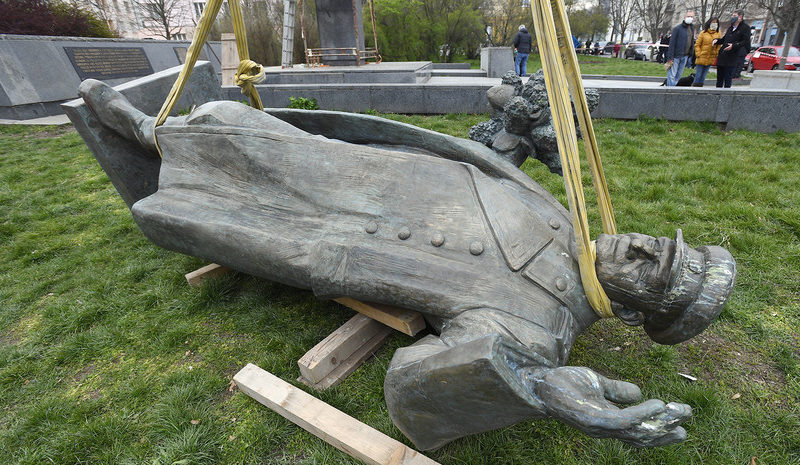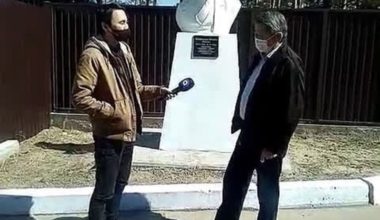On April 7, 2020, Russian President Vladimir Putin signed Federal Law No.112-FZ. “On the Amendments to the Russian Federation Criminal Code and the Russian Federation Code of Criminal Procedure”. Previously approved by the State Duma and the Federation Council, the bill came into legal force.
According to the law signed by the Russian president, the Criminal Code of Russia was amended with the following new article:
Article 243.4. Destruction or damage of military graves, as well as monuments, stelae, obelisks, other memorial sites or objects that perpetuate the memory of those who died in the defense of the Motherland or its interests, or dedicated to the days of Russian military glory
1. The destruction of, or damage to military graves, as well as monuments, stelae, obelisks, other memorial sites or objects that perpetuate the memory of those who died in the defense of the Motherland or its interests, or dedicated to the days of Russian military glory (including memorial museums or memorial signs at former battlefields), as well as monuments or other structures or objects dedicated to persons who defended our Motherland and its interests, with the purpose of damaging historical and cultural meaning of those objects, –
is punishable by a fine up to 3 mln roubles, or the minimum wage or other income of the convict for the period of three years, or three years of correctional labor, or the same term in prison.
2. A similar criminal act, when committed:
a) by a group of people, or by a group of people upon a preliminary collusion, or by an organized group;
b) in regard of military graves, as well as monuments, stelae, obelisks, other memorial sites or objects that perpetuate the memory of those who died defending of the Motherland or its interests during the Great Patriotic War, or dedicated to the days of Russian military glory within that period of time (including memorial museums or memorial signs at former battlefields), or other memorial structures or objects, as well as monuments, other memorial structures or objects, devoted to persons who defended our Motherland or its interests during the Great Patriotic War;
c) using violence or threating to use violence,
is punishable by a fine of 2 to 5 mln roubles, or equal to the wages of other income of the convict for the period of 1 to 5 years, or up to 480 hours of correctional labor, or up to 5 years of compulsory labor, or the same term in prison.”
The amendments to the Russian Code of Criminal Procedure, envisaged by the same Federal Law, provide for the fact that, if a crime envisaged by Article 243.4 of the Russian Criminal Code was committed by a foreign national, then the place for criminal proceedings is appointed by the Investigative Committee of Russia.
Immediately after Federal Law No. 112-FZ was made public, Russian defense minister Sergey Shoygu asked Head of the Russian Investigative Committee to “give legal assessment to the decision by the most nefarious representatives of governmental and local agencies in some foreign countries to dismantle monuments, stelae and obelisks that commemorate Soviet victims.”
The destruction of monuments dedicated to Soviet citizens has become widespread in Eastern Europe in recent years. Poland is especially active in pulling down Soviet monuments, with the Sejm having adopted amendments to the law prohibiting the propaganda of communism or other totalitarian form of government on June 22, 2017. The amendments treated Soviet monuments as communist propaganda, calling for their elimination from “public space”. According to Polish media, the new law covered at least 469 monuments. According to Jerzy Tyc, head of the Commonwealth of Kursk Polish public organization, there were still around one hundred surviving memorials to Soviet soldiers in Poland by late 2019, the rest been destroyed.
The later destruction of Soviet war memorials in Poland was legitimized by the resolution of the European Parliament on the importance of European remembrance for the future of Europe, dated September 19, 2019. Clause 18 of the resolution says that “the continued existence in public spaces in some Member States of monuments and memorials (parks, squares, streets etc.) glorifying totalitarian regimes, which paves the way for the distortion of historical facts about the consequences of the Second World War and for the propagation of the totalitarian political system.”
One of the latest examples of destroyed Soviet war monuments in Eastern Europe was the statue of Marshall Ivan Konev in Prague, dismantled on April 3, 2020.


